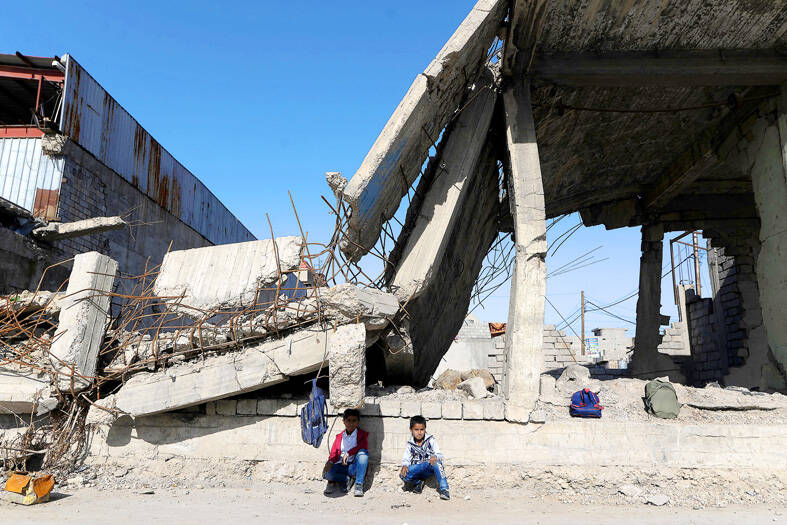The horrors of the Islamic State (IS) group’s rule over northern Iraq might be in the past, but efforts to bring the militants to justice are still gathering pace.
“A lot of work remains to be done,” said Christian Ritscher, the UN’s lead investigator into Islamic State activity.
Five years after the group’s defeat in Iraq, with many thousands of their members in Iraqi jails, work is ongoing to probe their crimes, said Ritscher, who heads the dedicated UN investigative team (UNITAD) seeking to promote accountability.

Photo: AFP
In a Baghdad interview, the former prosecutor described the grim task — undertaken with the cooperation of Iraqi authorities — as “challenging” and diverse in scope.
“We have just opened an investigation into the destruction of the cultural heritage of Iraq by IS — the destruction of mausoleums, churches, cultural sites, museums,” Ritscher said.
A future investigation would focus on crimes committed in Mosul, a major city in Iraq’s north which the Islamic State group occupied from 2014 until 2017, he said.
Iraq declared victory over the militants on Dec. 9, 2017, but the group kept its grip on territory in Syria until March 2019, when it was defeated by US-backed, Kurdish-led forces.
The rise of the Islamic State and its self-proclaimed “caliphate” appeared meteoric. Its seizure of Mosul helped it to briefly hold about one-third of Iraqi territory, and for a time there were real fears of a major attack on the capital, Baghdad.
Abuses against civilians, minorities and opponents became a hallmark of the group, whose ranks swelled with the arrival of thousands of foreign nationals.
The list of crimes is long and includes “genocide, crimes against humanity, war crimes,” Ritscher said.
UNITAD has supported local authorities that uncover mass graves and is working to prepare evidence for “any jurisdiction in the world that needs it ... even within several decades,” Ritscher said. “In 20 or 30 years, the perpetrators of international crimes will still be able to be judged. There is no limitation period.”
In its latest report, presented to the UN Security Council on Monday, UNITAD highlighted the group’s production of chemical and biological weapons.
The program included “the development, testing, weaponization and deployment of a range of chemical agents,” the report said.
UNITAD also investigated the Speicher massacre — when up to 1,700 “predominantly Shiite” Iraqi army cadets were abducted from a base and executed in June 2014.
Other atrocities examined were the deaths of hundreds of detainees from Badush prison, near Mosul, and crimes against the Yazidis, a religious minority many of whose men were executed and whose women were abducted for sexual slavery.
A German court last year sentenced former Islamic State member Taha al-Jumailly, who had let a five-year-old Yazidi girl in chains die of thirst, to life in prison for genocide and crimes against humanity, the first verdict of its kind worldwide.
The trial was held under the principle of universal jurisdiction, which holds that any national court can prosecute such crimes no matter where they were committed.
“Maybe in the future there will be a tribunal on IS crimes,” Ritscher said, adding that the idea is subject to “ongoing discussions.”

Incumbent Ecuadoran President Daniel Noboa on Sunday claimed a runaway victory in the nation’s presidential election, after voters endorsed the young leader’s “iron fist” approach to rampant cartel violence. With more than 90 percent of the votes counted, the National Election Council said Noboa had an unassailable 12-point lead over his leftist rival Luisa Gonzalez. Official results showed Noboa with 56 percent of the vote, against Gonzalez’s 44 percent — a far bigger winning margin than expected after a virtual tie in the first round. Speaking to jubilant supporters in his hometown of Olon, the 37-year-old president claimed a “historic victory.” “A huge hug

Two Belgian teenagers on Tuesday were charged with wildlife piracy after they were found with thousands of ants packed in test tubes in what Kenyan authorities said was part of a trend in trafficking smaller and lesser-known species. Lornoy David and Seppe Lodewijckx, two 19-year-olds who were arrested on April 5 with 5,000 ants at a guest house, appeared distraught during their appearance before a magistrate in Nairobi and were comforted in the courtroom by relatives. They told the magistrate that they were collecting the ants for fun and did not know that it was illegal. In a separate criminal case, Kenyan Dennis

A judge in Bangladesh issued an arrest warrant for the British member of parliament and former British economic secretary to the treasury Tulip Siddiq, who is a niece of former Bangladeshi prime minister Sheikh Hasina, who was ousted in August last year in a mass uprising that ended her 15-year rule. The Bangladeshi Anti-Corruption Commission has been investigating allegations against Siddiq that she and her family members, including Hasina, illegally received land in a state-owned township project near Dhaka, the capital. Senior Special Judge of Dhaka Metropolitan Zakir Hossain passed the order on Sunday, after considering charges in three separate cases filed

APPORTIONING BLAME: The US president said that there were ‘millions of people dead because of three people’ — Vladimir Putin, Joe Biden and Volodymyr Zelenskiy US President Donald Trump on Monday resumed his attempts to blame Ukrainian President Volodymyr Zelenskiy for Russia’s invasion, falsely accusing him of responsibility for “millions” of deaths. Trump — who had a blazing public row in the Oval Office with Zelenskiy six weeks ago — said the Ukranian shared the blame with Russian President Vladimir Putin, who ordered the February 2022 invasion, and then-US president Joe Biden. Trump told reporters that there were “millions of people dead because of three people.” “Let’s say Putin No. 1, but let’s say Biden, who had no idea what the hell he was doing, No. 2, and